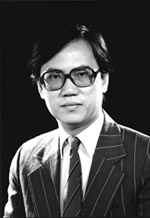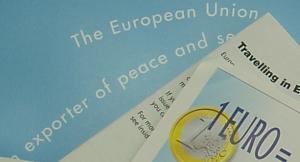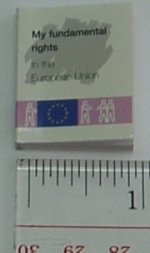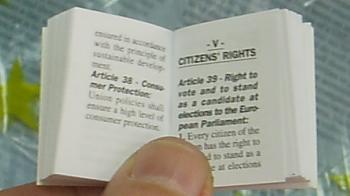


“Wow, it’s a beautiful day,” says wild American friend Odell, looking up at the sunshine cascading down through the skyscrapers of Central from the clear blue sky above. “Let’s go to the pub!”
I will meet him there later. But first I feel a need to visit the second-hand bookstore in Queen Victoria Street. Poking through the cramped shelves, I play a game. Which book would I least like to be stuck with on a long-haul flight? Canada in the Fifties looks like a strong contender. But I suspect it might be better than it sounds – not that this stops me resisting the temptation to buy it. Since my last visit, the amount of books in stock on dieting has risen from 180lb to over 400lb. And the badly needed volume Get A Life – How To Break Free From Self-Help Books In 10 Easy Steps has yet to appear. I come away with Colonial Hong Kong in the Eyes of Elsie Tu. If it’s as out-of-touch with planet Earth as the design of her website, it will be fascinating.


Prickly Peking paranoiacs pucker in pique. Hong Kong’s former Governor Chris Patten makes his annual visit to his old domain. It’s the usual story. Fat Pang the sinning, tango-dancing whore, triple violator and colonial oppressor hits town to sign copies of his latest literary masterpiece and is greeted by the city’s people as their long-lost hero and saviour, in embarrassingly stark contrast to the timid or indifferent reception they afford his successors or representatives of our current sovereign power .
Flanked by small boys in loincloths fanning him with ostrich feathers, the rotund Brit shakes hands with adoring crowds of erstwhile subjects who throw flowers at his feet and offer him babies to kiss, egg tarts to gobble and intimate female apparel to sign. Fans clutching Patten memorabilia mob bookstores like followers of a young pop star, a glamorous actress or a charismatic religious leader offering hope – which, to old, overweight gwailos who failed to make it to the top, he probably does.
“I reflect wryly that there were never several hundred thousand people on the streets when I was Governor,” he muses between ritual pleasantries and expressions of respect to Hong Kong’s current leaders. After becoming the 7,000,001st person to say the idea of a Goods and Services Tax stinks, he gets a dressing down from Financial Secretary Henry Tang, who accuses His Corpulence of leaving Hong Kong’s economy unprepared for the horrors that, by pure coincidence, hit it soon after Tung Chee-hwa took over in 1997. Patten deftly puts Henry in his place by saying he thinks the Financial Secretary in those days did a rather good job of looking after the economy, implicitly inviting Henry to take the matter up with Donald Tsang, now his boss.
Although opposition to a GST cuts across political and social strata, the proposal has obvious potential as a weapon for the pro-democracy camp. It is reasonable to wonder what British-trained ex-civil servant Sir Bow-Tie is playing at, releasing the plan at this time. A time when British-trained ex-civil servant Anson Chan has been making more strident and heartfelt pleas for universal suffrage and has just gone on a trip to the UK. A time when British-trained ex-civil servant Regina Ip has returned from Stanford academically recounting arguments for political reform that defy conservative criticism. A time when British-trained ex-civil servant Lily Yam throws another hot potato into the game with comments essentially backing Anson. A time when all these barbarian-brainwashed ex-colonial running dogs’ blubbery old imperialist boss flies in from England, to be met with open arms by multitudes of supposedly Chinese citizens. The only reason for officials in Beijing not to believe that there is a foreign plot to re-take Hong Kong is that the conspiracy is too obvious, blatant and unguarded. But then – their obsessive and suspicious logic will surely conclude – that’s what they want us to think.






“He’s not available at the moment! He’s in the toilet! He has diarrhea!” With a slam of the phone, Ms Fang the hunter-killer secretary dispenses with another caller trying to get through to the Chairman of S-Meg Holdings. It could be an aging Aunt wanting to scold him for paying shareholders lousy dividends. It could be a fellow tycoon proposing a multi-billion dollar deal. It could be the Chief Executive wanting him to talk up an unpopular Government policy. It could be Beijing. Ms Fang aims to repel everyone, and, one way or another, she succeeds. On rare occasions, when she is not irritated by the weather, public transport, menstrual cramps, the three Stanleys in the mailroom, the Company Gwailo, the air conditioning, a ‘Free Gift!’ that never materialized, Mainland tourists dressed as monks and begging, the cover of Apple Daily, incessant demands for help from the Big Boss’s wife, the need to juggle the great man’s schedule with that of his overweight Mainland mistress, or a million other nuisances, she might offer to take a message.
So I tend to admire strangers who manage to get an appointment with the Big Boss, especially when they have limited value in terms of connections, wealth or social status. And I try to get off to a good start this morning when I am dragged along to sit in on a meeting with a pair of officials from the European Union. But it doesn’t last. We are subjected to blather about the importance of trade and cultural relations with Hong Kong. We hear of such remote lands as Slovakia and Slovenia. To me, they conjure up visions of grainy, speeded-up, black and white film footage with a voice-over by AJP Taylor on gathering storm clouds. The Big Boss struggles to stay awake. Then we get a lecture on this institution’s major role on the international stage. I thought it was a trade bloc, but it seems it is some sort of super-country. The strange-accented bureaucrats talk of the EU’s foreign policy, its promotion of peace and human rights in the developing world and the importance of multilateralism. Countries, they tell us, shouldn’t act alone without international consensus.
“Oh, you mean like the US?” asks the Big Boss with a laugh. The two Eurocrats refuse to be drawn. “Or the UK?” he adds. The continental representatives suddenly become very serious and claim with perfectly straight faces that the British are part of the European Union. S-Meg’s visionary chief insists they are mistaken, but the two Europeans are adamant. When asked, I say it sounds unlikely. The pair are even more dismayed when the Big Boss responds to their question about how many dealings the company conducts in Euros with a stupefied look followed by a blunt “none.” Some profits are booked in Renminbi, Yen, Pounds and Southeast Asian currencies, he explains, but basically it’s US Dollars all the way. Maybe, the emissaries suggest, oil and other commodities will be priced in Euros one day. The Big Boss nods weakly. They’re gwailos, he seems to be thinking, but not as we know them.
Eventually, we ease them out of the conference room and into the elevator, but not before being showered with gifts. Glossy brochures (available in over a dozen languages should we wish) about enlargement, delimitation of competencies, a so-called Parliament and other Brussels-based bizarreness, including a book called My Fundamental Rights in the European Union.





Wed, 26 July
Tossing the weird, microscopic Bill of Euro-rights into the bin in my office, I am struck by a brilliant insight. The difference between the US Bill of Rights (and its 1689 predecessor) on the one hand, and the idiotic Euro-rabble version on the other, is that the former deliberately aims to limit the power of the state, while the latter extends it, by attempting to guarantee citizens all manner of desirable outcomes in life. Then it occurs to me that this amazing thought is almost certainly not original at all. I might not even have arrived at it independently – indeed, the more I consider it, the more I think I might have subliminally absorbed it from Hayek, or The Economist, or somewhere.
In their attempts to find a story, the press latched on to the lady’s view that civil groups cannot be in a state of permanent protest or lobbying. To the media, this smacked of the old jackbooted, whip-flicking Obergruppenfuhrer Ip of four years ago, warning people to keep in their place. But it’s just common sense – she named the pair of obscure but eminent academics who made the point decades ago. Citizens have lives, and governments need time to get things done. It was all a bit of a yawn.
Thurs, 27 July
The Government announces plans for Hong Kong’s most lavishly paid internships – two layers of political appointees to assist Directors of Policy Bureaus. Press reaction is dubious. Will these deputy ministers and assistants to ministers wedge themselves between their bosses and senior civil servants? Will they usurp the role of the mandarins? Will our highly trained, professional and politically neutral bureaucrats be humiliated by having to take orders from callow party hacks?
Administrative Officer Winky Ip is never more radiant than when she is angry, so I enter the Foreign Correspondents Club expecting to set eyes on a silently seething beauty in the corner, stirring her congee with malice. But it is not to be. She is relaxed and content, and no more elegantly handsome to behold than usual. She laughs when I offer her my sympathies for her prematurely stunted career path. “Read the proposal,” she tells me, tossing the consultation paper over the table to me. I flick through it. The tone of condescension, the air of smugness, the carefully phrased mendacity, the selective ambiguity – it’s all unmistakable. Civil servants wrote this thing.
“Officially, the idea is to nurture political talent,” Winky says. “Actually, it’s basic… what’s the word?” I suggest ‘cronyism’, but this produces a slight wince. “Donald wants to get a more solid base of support in the Legislative Council for his second term,” she explains. “So we pull in people from potentially friendly parties, give them lots of face, then they go back and lobby legislators and the media.”
That’s the main task of the proposed Deputy Directors of Bureau. They are humble press secretaries wrapped up in chauffeur-driven cars to make them look important. The job description that Winky’s colleagues have lovingly drafted for the Deputies’ underlings is so lowly as to be insulting…
(a) lining up suitable public and social appointments to assist Directors of Bureau and Deputy Directors of Bureau in reaching out to the community;
(b) helping out in the networking with various stakeholders and community liaison; and
(c) preparing political statements and speeches for Directors of Bureau and Deputy Directors of Bureau.
“Yes, that’s it,” confirms Winky. “If it goes ahead. The salaries we’re proposing are quite, um, generous.” Around HK$200,000 a month for the Deputies and HK$100,000-150,000 for the bag-carrying Assistants. Call it 10 times median household income. She gives me a slightly evil smile. “I think some Legco members would find it hard to explain to their constituents why they voted for it.”
Fri, 28 July
One of Hong Kong’s family-run conglomerates faces disappointing third-quarter earnings. In fact, it faces disappointing everything over any timeframe. How can it re-position itself and go back to being the outstanding success story it used to be before, many years ago, the late founder handed over to his first-born son? It could divest itself of unproductive assets. It could re-focus on higher-growth markets. It could re-engineer processes, de-layer the organization, and otherwise go berserk running around, frothing at the mouth, re-inventing and streamlining anything that moves with an axe.
Or, its board of directors might decide the senior management is inept, and kick them out. Ha! Just joking. That certainly won’t happen, because S-Meg Holdings’ board is packed full of independent, non-executive cousins, in-laws and golf partners. As for the other remedies, the Big Boss doesn’t have any time for Westerners’ cold, analytical methods of inquiry and boring, unemotional style of problem-solving. He makes decisions quickly, on gut instinct, and if anything goes wrong it’s somebody else’s fault. But several months of banging his fist on the table and shouting at his management team hasn’t had much of an impact. So there is only one thing for it.
The feng-shui man, drab-faced, late 60s, dressed in a shabby suit, creeps around the top floor of S-Meg Tower at an inconvenient (or ‘auspicious’) time in the early morning. He peers suspiciously at the place. It must be four years since his last visit, and things have changed. New skyscrapers in the city’s central business district have disrupted the circulation of mysterious, profit-enhancing forces emanating from dragons in hillsides. Unwise rearrangements of office furniture have, predictably, hosted investment decisions that proved imprudent. He points at a clock on the wall and snaps at his escort, our Deputy Managing Director. Of course your subsidiary’s working-capital-to-sales ratio is going to be a mess if you put that there, he’s probably saying. He saves his sourest face for his quick glance around my office. There is much for the geomancer to find distasteful in the gwailo’s lair. The stuffed aardvark on the filing cabinet, leering across the room and out of the window, leaking energy and luck out into the harbour. The 1966 Rupert the Bear Annual, lying at an awkward angle on the little coffee table, its curled corner pointing menacingly in the direction of the Big Boss’s office. A fearsome-looking knife – an envelope-cutter in real life – plunged provocatively into a vaguely skull-shaped holder that is white, the colour of death. As is, worst of all, is the gwailo itself, behind the desk, preparing Uncorrected Personality Traits by Robyn Hitchcock for the three Stanleys in the mailroom.
I am disruptive to the company’s feng-shui. I remove patches of carpet placed at strange angles in doorways on the grounds that “someone’s going to trip over that thing and sue us for millions.” I openly and laughingly dismiss as ‘voodoo’ the idea that painting a door red will improve business. In short, I threaten the flow of wealth. The flow of wealth, that is, from gullible, superstitious corporate officers to greasy-haired old shysters blathering on about chi and ordering tables and fish tanks to be moved into the least practical locations. He shudders and withdraws without a word.

